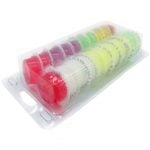What Do Ants Eat?
What types of food do ants like? How can I feed my captive ants?
What do ants eat? This is a question I am asked a lot. The diet of ants around the world is wide and varied. As this website is about British species of ant, I will concentrate on those species.
Ants are scavengers
On the whole, ants are scavengers. The types of food that ants like are remarkably similar, yet there are those whose diets are more specialised. On the whole, UK ants eat soft-bodied mites, insects, the larvae of various flies and beetles, and springtails. In addition to this Myrmica species, such as M. rubra, also like spiders. I have noticed, in my experience, that Lasius niger do not seem to like spiders very much, though they will eat them.
Ants will also scavenge from carrion (dead mammals) such as birds and mice. They are not particularly adept hunter. Ants tend to get most of their food opportunistically, such as when insects get injured and cannot move or defend themselves. Or when ants discover insects, freshly dead by other means.
As most people know, ants like to eat sweet sugary things, such as fruit, especially over-ripe, jam, candy and honey. However, for the development of the larvae and the egg-producing of the queen, insect protein is needed. Adult ants can quite happily live off a sugar diet.
Ants are cannibals
Other types of food that ants like are, not surprisingly, other ants, especially the large female flying ants that fly in the summer months. If a winged queen is unfortunate enough to land in a territory already occupied by an ant colony, she can consider herself incredibly lucky if she avoids being discovered by foraging ants, attacked and eaten.
Ants are farmers
One thing that fascinates me about what ants like to eat is how they ‘farm’ other insects for the mutual benefit of both. An example of this involves aphids. Ants love honeydew, a sweet substance produced by aphids, or greenfly. Gardeners are probably well aware of the damage that aphids do to rose stems. But ants are very fond of the honeydew that these aphids produce. Lasius niger, for example, ‘farm’ aphids by placing them onto choice stems, and the ants will protect them from predators such as ladybirds.
When a hungry ant approaches an aphid, it will gently tap the aphid on the back with its antennae. In response the aphid will produce sweet honeydew, and the ant will eat it. Some ants species, such as Lasius flavus, bring aphids into their nests to feed on the live roots exposed by their nest building.
Ants are adept food gatherers
The amount of food that an ant colony bring in can be staggering. The red wood ant of southern England, Formica rufa, can bring in up to 100,000 insects a day if the ant colony is large and well established.
Not all ants forage above ground for their food. The yellow meadow ant Lasius flavus tend to avoid foraging on the surface but look for food underground. This includes those found when they excavate their nests, or from any unfortunate insect that happens to stumble into their nests.
Some UK ants will eat seeds, or rather parts of the seed. Lasius alienus like to collect the seeds of the dwarf gorse plant, Ulex minor. Lasius niger will occasionally eat part of the viola and primula seeds, though these ants tend to eat the stalks and caruncle which contain a type of edible oil.
Outside of the UK there are ants that feed on various seeds as the Harvesters do. Others feed on a fungus grown from leaves that they have chewed up and deposited in ‘gardens’ within their nests. The Leafcutter ants of the Amazonian rainforests are well-known for this. There is even a species of ant that feed of the blood of their own larvae and are often called Vampire or Dracula Ants.
What should I feed my captive ants?
Questions I get asked a lot by those who keep ants, especially if it is the first time, they are keeping them is, what do I feed my ants? How often should I feed them? How should I feed them?
Well, you can feed them according to the information I have given above when I answered the question of what do ants eat. I find that it is best to give them what they would normally eat in the wild. However, here is a list of things I feed my captive colonies.
- Wax worms – the larvae of the Greater Wax Moth
- Flies – especially those big fat slow moving ones that come into your house on sunny summer days. They love them!
- Fruit beetle larvae
- Meal Worms – larvae of the meal beetle
- Various beetles
- Crickets/Grasshoppers/Locusts
- Maggots and other insect larvae
What do ants eat in the winter?
Winter can be a difficult time to provide your captive ants with live food. Fortunately they are cheaply available on the internet or in local pet stores. If you click on the image below, it will take you to Livefood UK, a site that I have used many times to purchase insects as food for my ants. This induces crickets, waxworms, mealworms and cockroaches.
My parents won't let me buy insects / I don't like to kill things. What should I do?
Perhaps you don’t like to kill insects to give to your ants. Maybe you are a kid whose parents won’t let you buy live insects from the internet. You are probably wondering what types of food ants like that you can use instead of insects. Never fear as there is something else you can buy that is not an insect or any other type of living creature: protein jelly! This has been a Godsend for me and my ants especially when I was in the Navy, when I spent much of the year away from home.
The protein jelly is often sold by sites that provide food for reptiles. It is, as the name suggests, a jelly, often coloured and/or flavoured, which is fed to reptiles. It is also perfect for ants; especially for the queen and larvae. Admittedly, it is best to give your ants freshly killed insects, but this jelly is an awesome alternative. The good thing about it is that, unsealed, it can last up to a year. Once opened and if kept in your fridge, it can last a couple of months. Even if you start to see mould growing on it when you take it out of the fridge, you can just scrape the mould off. My ants really enjoy this jelly and it has kept my colonies alive for a seven-month period when I was away from home, and a friend was looking after them for me.

Ideally, ants should be fed with their choice of food according to their species. Fortunately, ants in the UK have similar diets of insects. Should you not be able to obtain insects for your captive ants, this jelly is ideal.
How much food should I give to my ants?
Another question I am often asked and, to be fair, a difficult one to answer. It really depends on how many ants your colony has and, more importantly, how many larvae it has. Larvae are hungry little things and always seem to want to be fed by the adult workers. For a small colony consisting of about a dozen workers with little or no brood; probably only two or three insects a week. For a large colony with thousands of ants and larvae, it is going to take a lot of insects.
The best thing I find to do is give your ants a couple of insects and just see how often they eat from it and how many ants are eating it. If you find that they eat only a little, then you can reduce the food amount. If you find that any food you put in is constantly being swarmed by ants, then increase the amount you put in. It’s all by trial and error really. The same goes with the protein jelly; if it is being constantly swarmed by ants then increased the ‘dosage’.
Whatever you give the ants, insects, fruit or jelly, I would suggest removing any that is remaining after 48 hours, unless the ants are still constantly eating from it.
If you are still not sure how much to feed your ants, then feel free to contact me and tell me what species you have and the number of ants and brood present (just a rough guess will do), and I will try to help you out.
Where can I get protein jelly?
If you click on the image below, it will take you to AntsUK, a website that sells it.
Ask questions about ants
If you wish to ask me a question about ants (and no, I won’t tell you how to destroy them or their nests!) then please contact me on my**@an*****.uk or you can ask on the contact thread
I aim to respond to your questions as quickly as I can, normally within 24 hours.

